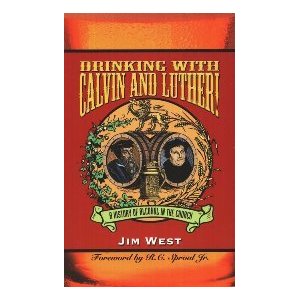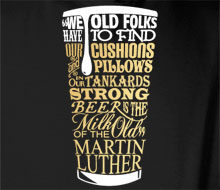Well Drunk

August 1, 2013
 Funny story: My good friend Dana asked for this book, Drinking with Calvin and Luther!, for her birthday. It was not available through Amazon directly, so I had to go through the publisher. The book took forever to come, and when it did finally arrive, the flimsy manila envelope it was packaged in had a gash in it, along with the back of the book. The top of the spine also has a big dent that leaves an impression in many of the back pages. I was pretty perturbed. This 215 page paperback cost $17 plus shipping.
So I emailed the publisher, trying to keep it real, but Christianly polite. I was thinking of what a hassle it was going to be to ship the book back to California (if they accepted my return), and then wait even longer for a new copy. To my surprise, the publisher got right back to me apologizing, with the promise that a new copy was on the way in priority mail. Redemption.
And an added bonus. Sometimes I pull an “Aimee” with Dana’s gifts. Her book looks so appealing, that I just crack the spine a little to read the first couple of pages. Next thing you know, I’m in deep. I end up wrapping a pre-read present, handing it over in humble confession. Dana encourages me to give in. But this time I don’t have to. The damaged copy is still in my possession and I will not let it go to waste!
What a cool book! That is, with the disclaimer that for those in the world, as Carl Trueman puts it, “where evangelical comment is increasingly censored from within by the humourless and the Top Men,” this book could be, like Trueman and Pruit’s podcast, “a samizdat operation” that may offend our contemporary culture. But that is what the author, Jim West, is trying to change. This is a fine book on the History of Alcohol in the Church. It is humorous, enlightening, educational, and leads to much reflection.
One area that has me thinking is simply the reason why we drink. I’ve often looked at the case for alcohol being such a staple in church history more on the level of necessity. With the poor water quality, drinking alcoholic beverages was a matter of health. And, yes, I’ve always looked at it as a gift from God’s creation that should be enjoyed. But it seems like our evangelical culture would have those who would insist on enjoying their Christian liberties do it in a clandestine fashion. I partake because I appreciate a good drink and I know that a glass will help untie all the knots in my brain at night, but also because it makes me merry. And West wants to emphasize this aspect of the gift from God’s creation.
He quotes the venerable John Calvin, “It is permissible to use wine not only for necessity, but to make us merry” (53). In his commentary on Ps. 104:15, Calvin emphasizes that drinking must be moderate. But “his second consideration may surprise the ignorant, and even shock the pietist; he argued that ‘in making merry,’ those who enjoy wine ‘feel a livelier gratitude to God’” (53).
Of course, Martin Luther was a beer man. His wife, Katherine, was a skilled brewstress (which was a common vocation for a housewife). Luther is known for saying that he “drank freely ‘to spite the devil’” (33). Alcohol was part of everyday life. These days, we may question whether someone who drank everyday was an alcoholic. But Luther also offers a witty definition to help us distinguish a drunk: “Drunkenness: when the tongue walks on stilts and reason goes forward under a half sail” (30).
This book is important to both to libertine and the legalist because, as R.C. Sproul Jr. says in the Forward, “it’s not enough that we should drink, but that we ought to drink well” (6). Heck, I’m only on page 64 of my unbirthday present and I was provoked to write about good drinking. The commentary West shares from the Geneva Bible on John 2:10 made me close the book and reflect some more:
Funny story: My good friend Dana asked for this book, Drinking with Calvin and Luther!, for her birthday. It was not available through Amazon directly, so I had to go through the publisher. The book took forever to come, and when it did finally arrive, the flimsy manila envelope it was packaged in had a gash in it, along with the back of the book. The top of the spine also has a big dent that leaves an impression in many of the back pages. I was pretty perturbed. This 215 page paperback cost $17 plus shipping.
So I emailed the publisher, trying to keep it real, but Christianly polite. I was thinking of what a hassle it was going to be to ship the book back to California (if they accepted my return), and then wait even longer for a new copy. To my surprise, the publisher got right back to me apologizing, with the promise that a new copy was on the way in priority mail. Redemption.
And an added bonus. Sometimes I pull an “Aimee” with Dana’s gifts. Her book looks so appealing, that I just crack the spine a little to read the first couple of pages. Next thing you know, I’m in deep. I end up wrapping a pre-read present, handing it over in humble confession. Dana encourages me to give in. But this time I don’t have to. The damaged copy is still in my possession and I will not let it go to waste!
What a cool book! That is, with the disclaimer that for those in the world, as Carl Trueman puts it, “where evangelical comment is increasingly censored from within by the humourless and the Top Men,” this book could be, like Trueman and Pruit’s podcast, “a samizdat operation” that may offend our contemporary culture. But that is what the author, Jim West, is trying to change. This is a fine book on the History of Alcohol in the Church. It is humorous, enlightening, educational, and leads to much reflection.
One area that has me thinking is simply the reason why we drink. I’ve often looked at the case for alcohol being such a staple in church history more on the level of necessity. With the poor water quality, drinking alcoholic beverages was a matter of health. And, yes, I’ve always looked at it as a gift from God’s creation that should be enjoyed. But it seems like our evangelical culture would have those who would insist on enjoying their Christian liberties do it in a clandestine fashion. I partake because I appreciate a good drink and I know that a glass will help untie all the knots in my brain at night, but also because it makes me merry. And West wants to emphasize this aspect of the gift from God’s creation.
He quotes the venerable John Calvin, “It is permissible to use wine not only for necessity, but to make us merry” (53). In his commentary on Ps. 104:15, Calvin emphasizes that drinking must be moderate. But “his second consideration may surprise the ignorant, and even shock the pietist; he argued that ‘in making merry,’ those who enjoy wine ‘feel a livelier gratitude to God’” (53).
Of course, Martin Luther was a beer man. His wife, Katherine, was a skilled brewstress (which was a common vocation for a housewife). Luther is known for saying that he “drank freely ‘to spite the devil’” (33). Alcohol was part of everyday life. These days, we may question whether someone who drank everyday was an alcoholic. But Luther also offers a witty definition to help us distinguish a drunk: “Drunkenness: when the tongue walks on stilts and reason goes forward under a half sail” (30).
This book is important to both to libertine and the legalist because, as R.C. Sproul Jr. says in the Forward, “it’s not enough that we should drink, but that we ought to drink well” (6). Heck, I’m only on page 64 of my unbirthday present and I was provoked to write about good drinking. The commentary West shares from the Geneva Bible on John 2:10 made me close the book and reflect some more:
The Master of Cana’s marriage feast says, “Every man at the beginning sets out the good wine, and when the guests have well drunk, then that which is inferior; but you have kept the good wine until now.” The Geneva Bible highlights the expression “well drunk.” Notice: the wine is not only drunk, but “well drunk.” This is different from drinking well. We drink well when we drink to the glory of God and when our drinking does not exceed the limits of moderation. However, the wine is to be “well drunk” too. God’s gifts are not to be used tentatively, as if we are sampling remnants or sipping the king’s drink to discover whether it contains poison. The table that the Lord has set before us must be heartily consumed! (64)And so the Geneva Bible emphasizes the “plentiful use of wine, as does not pass measure, as Genesis 43:34” (64).
 I’ve written before about Dorothy Sayers’ great distinction on Christians and vocation. Moving past the matter of pay, work conditions, and profits, she wanted to know “what goes into the beer?” And West points out a 13th century Augsburg law, “The selling of bad beer is a crime against Christian love” (39). But he also moves us to ask questions as consumers. Are we drinking well? And, are we well drunk? By all means, don’t participate in drunkenness, but consider laughing with some friends over your favorite beverage to the glory of God and his good gifts.
I’ve written before about Dorothy Sayers’ great distinction on Christians and vocation. Moving past the matter of pay, work conditions, and profits, she wanted to know “what goes into the beer?” And West points out a 13th century Augsburg law, “The selling of bad beer is a crime against Christian love” (39). But he also moves us to ask questions as consumers. Are we drinking well? And, are we well drunk? By all means, don’t participate in drunkenness, but consider laughing with some friends over your favorite beverage to the glory of God and his good gifts.




